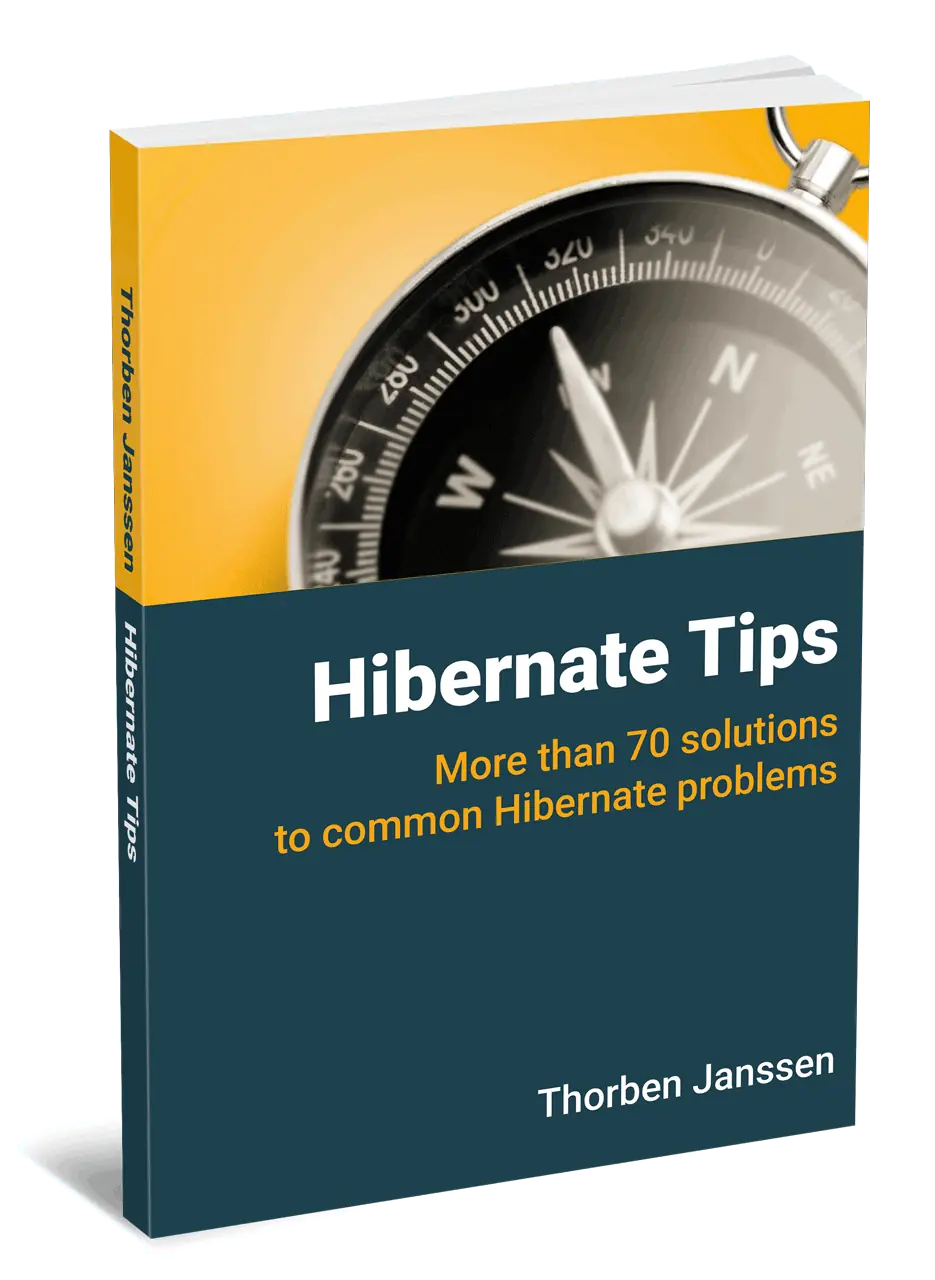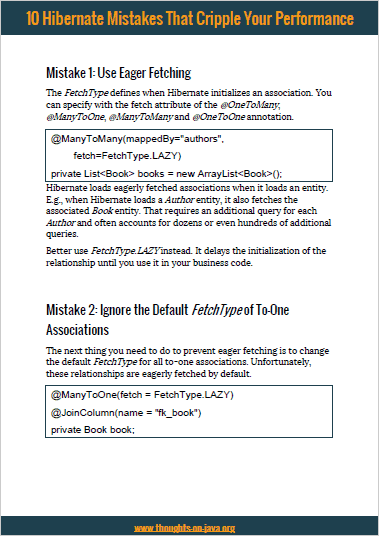Hibernate Tips: How to filter entities from a mapped association?
Take your skills to the next level!
The Persistence Hub is the place to be for every Java developer. It gives you access to all my premium video courses, monthly Java Persistence News, monthly coding problems, and regular expert sessions.
Hibernate Tips is a series of posts in which I describe a quick and easy solution for common Hibernate questions. If you have a question you like me to answer, please leave a comment below.
Question:
I want to exclude some records from an association mapping. How can I filter the elements of a mapped entity association?
Solution:
You can use Hibernate’s @Where annotation to define an SQL clause which filters the elements of a mapped association.
Let’s take a look at an example. Books can be published in different formats, e.g. as an ebook or as a paperback. You can model that with a Book entity and a Format enum.
@Entity
public class Book {
@Id
@GeneratedValue(strategy = GenerationType.AUTO)
@Column(name = "id", updatable = false, nullable = false)
private Long id;
@Enumerated(EnumType.STRING)
private Format format;
@ManyToMany
@JoinTable(name = "book_author",
joinColumns = {@JoinColumn(name = "fk_book")},
inverseJoinColumns = {@JoinColumn(name = "fk_author")})
private List<Author> authors = new ArrayList<Author>();
...
}
public enum Format {
PAPERBACK, EBOOK;
}
Each Book was written by one or more authors. So, you need a many-to-many association between the Book and the Author entity. As you can see in the code snippet, I modeled that as a typical many-to-many association on the Book entity.
You could, of course, do the same on the Author entity. But let’s say you want to use different associations for ebooks and physical books. In that case, you need to define 2 associations on the Author entity and filter them accordingly.
As you can see in the following code snippet, you can easily do that with a @Where annotation. You just need to provide an SQL expression which Hibernate adds to the WHERE clause of the SQL statement.
@Entity
public class Author {
@Id
@GeneratedValue(strategy = GenerationType.AUTO)
@Column(name = "id", updatable = false, nullable = false)
private Long id;
@ManyToMany(mappedBy = "authors")
@Where(clause = "format = 'EBOOK'")
private List<Book> ebooks = new ArrayList<Book>();
@ManyToMany(mappedBy = "authors")
@Where(clause = "format = 'PAPERBACK'")
private List<Book> printBooks = new ArrayList<Book>();
...
}
When you now load an Author entity and initialize the associations, Hibernate executes independent SQL statements to get the elements of the ebooks and printBooks association and uses the provided SQL snippet in the WHERE clause.
14:02:09,070 DEBUG [org.hibernate.SQL] -
select
author0_.id as id1_0_0_,
author0_.firstName as firstNam2_0_0_,
author0_.lastName as lastName3_0_0_,
author0_.version as version4_0_0_
from
Author author0_
where
author0_.id=?
14:02:09,109 DEBUG [org.hibernate.SQL] -
select
ebooks0_.fk_author as fk_autho2_2_0_,
ebooks0_.fk_book as fk_book1_2_0_,
book1_.id as id1_1_1_,
book1_.format as format2_1_1_,
book1_.title as title3_1_1_,
book1_.version as version4_1_1_
from
book_author ebooks0_
inner join
Book book1_
on ebooks0_.fk_book=book1_.id
and (
book1_.format = 'EBOOK'
)
where
ebooks0_.fk_author=?
14:02:09,117 DEBUG [org.hibernate.SQL] -
select
printbooks0_.fk_author as fk_autho2_2_0_,
printbooks0_.fk_book as fk_book1_2_0_,
book1_.id as id1_1_1_,
book1_.format as format2_1_1_,
book1_.title as title3_1_1_,
book1_.version as version4_1_1_
from
book_author printbooks0_
inner join
Book book1_
on printbooks0_.fk_book=book1_.id
and (
book1_.format = 'PAPERBACK'
)
where
printbooks0_.fk_author=?
Learn More
Another common use case for Hibernate’s @Where annotation is the implementation of a soft delete. I explain that in more detail in How to implement a soft delete with Hibernate.
Hibernate Tips Book

Get more recipes like this one in my new book Hibernate Tips: More than 70 solutions to common Hibernate problems.
It gives you more than 70 ready-to-use recipes for topics like basic and advanced mappings, logging, Java 8 support, caching, and statically and dynamically defined queries.


Is there a way to create a DB entry BOOK with automatically-set format = “EBOOK” when adding a Book object into the ebooks list?
Hi Thorben,
What could be the solution in case filter value (EBOOK/PAPER) is a run time value?
Hi,
In that case, you should use a JPQL query that returns the required information. You can’t adapt the mapping at runtime.
Regards,
Thorben